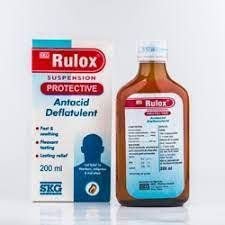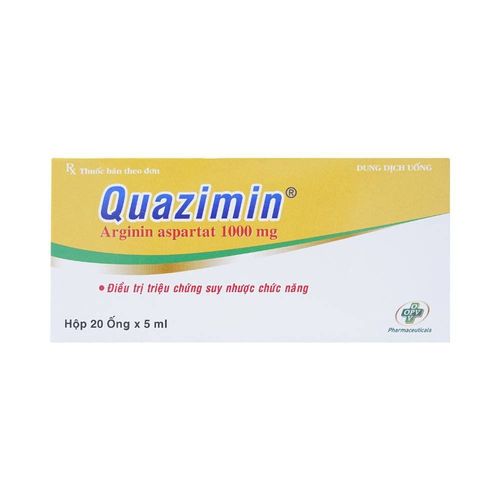This is an automatically translated article.
Argistad 1g drug is prepared in the form of an oral solution, with the main ingredient being arginine hydrochloride. Medicines are used to treat many different medical conditions (as prescribed by your doctor).
1. Uses of the drug Argistad 1g
What is Argistad ? Argistad is available in the form of an oral solution (Argistad 1g) or capsules (Argistad 500). The article mainly refers to the oral solution form.
Argistad drug solution contains Arginine 1.5g/ml. Arginine is an amino acid very necessary for the body, directly involved in the process of creating urea in the liver, helping to detoxify Ammonia in the liver. At the same time, Arginine also increases blood glucose levels.
Indications for the use of Argistad:
Maintenance treatment of hyperammonemia in patients with carbamylphosphate synthetase deficiency, ornithin transcarbamylase deficiency; Maintenance treatment for patients with hyperammonemia, argininenosuccinicuria, citrulinemia; Supportive treatment for people with indigestion; Adjuvant therapy improves exercise capacity in stable cardiovascular patients; Nutritional supplementation for patients with urea cycle disorders such as: citrulinemia, type I and II hyperammonemia, argininenosuccinicuria, deficiency of the enzyme N - acetylglutamate synthase. Contraindications to the use of Argistad:
Patients with hypersensitivity to the ingredients and excipients of the drug; People with allergies; People with urea cycle disorders with arginase deficiency.
2. Usage and dosage of Argistad 1g
Usage: Orally.
Dosage:
Maintenance treatment of hyperammonemia in patients with carbamylphosphate synthetase deficiency, ornithin transcarbamylase deficiency: For infants and children from 1 to 18 months of age, the dose is 0.5ml/kg/day, divided into 3-4 divided doses. time; Maintenance treatment for patients with hyperammonemia, argininosuccinicuria, citrulinemia: For infants and children from 1 to 18 months of age, the dose is 0.5 - 0.875ml/kg/time, divided into 3-4 times per day. day with food. Dosage may be adjusted according to the patient's response; Supportive treatment for indigestion: For adults, use a dose of 15 - 30ml/day; Treatment to improve exercise capacity in patients with stable cardiovascular disease: Adults use a dose of 30 - 105ml/day, note not to use more than 40ml/time; Nutritional supplementation for patients with urea cycle disorders such as: citrulinemia, hyperammonemia type I and II, arginine in the urine, deficiency of the enzyme N - acetylglutamate synthase: Adults take a dose of 15-100ml/day depending on the condition of the patient. . *Note: The above dosage of Argistad 1g is for reference only. The doctor can base on the patient's condition and progress to prescribe the most appropriate dose.
Overdose: When taking Argistad drug overdose, the patient may experience transient metabolic acidosis accompanied by tachypnea. Treatment of overdose with intravenous fluids. After the infusion, the acidosis is neutralized and the base deficiency returns to normal. If the condition persists, determine the extent of the deficiency, correcting by calculating the amount of alkylating agent used.
Missed dose: When a dose of Argistad is forgotten, the patient should take it as soon as possible. If it is almost time for your next dose, skip the missed dose and take your next dose at the scheduled time.
3. Side effects of the drug Argistad 1g
When using Argistad 1g, patients may experience some side effects such as:
Metabolism: Increased BUN, serum creatinine; Digestion: Abdominal pain, bloating; Blood vessels: Increased cyanosis of extremities; Blood and lymphatic system: Sickle cell anemia, thrombocytopenia; Immune system: Allergic reactions include swelling of the face and hands and a red rash. When taking Argistad 1g, if you experience an allergic reaction, the patient can stop the drug and use more diphenhydramine (as prescribed by the doctor). Allergic reactions will quickly subside.
4. Caution when using Argistad
Some notes patients need to remember before and while using Argistad 1g:
Pay attention to the sugar content of the drug (2g/5ml) when used for patients with diabetes or patients on a sugar diet; Discontinue the drug if the patient has diarrhea; Arginine component in the drug can change the ratio between intracellular and extracellular potassium, plasma potassium concentration may be increased when using Arginine in patients with renal failure. Therefore, it should be used with caution in people with kidney disease or dysuria; The use of high doses of Arginine for the treatment of acute hyperammonemia may lead to hyperchloremic metabolic acidosis. Therefore, it is necessary to monitor the concentration of chloride and bicarbonate in the blood plasma, and add the corresponding amount of bicarbonate; Arginine contains high levels of metabolic nitrogen, so the temporary effects of high nitrogen levels on the kidneys should be assessed before starting Arginine use; Arginine is not effective in the treatment of hyperammonemia due to dysorganic acidemia (do not use the drug in this case); Argistad medicine 1g contains sucrose (white sugar), so it should not be used for patients with fructose intolerance, sucrase - isomaltase enzyme deficiency or glucose - galactose malabsorption; Argistad medicine 1g contains methylparaben and propylparaben - 2 ingredients that can cause allergic reactions (usually occur late); Use caution when using Argistad in people driving, operating machinery; Argistad should not be used during pregnancy, and should be used with caution in nursing women (follow your doctor's prescription).
5. Argistad drug interactions 1g
Some drug interactions of Argistad 1g include:
Concomitant use of Argistad and thiazide diuretics, xylitol and aminophylin may increase insulin plasma concentrations; Long-term use of oral sulfonylurea antidiabetics may inhibit the response of plasma glucagon to arginine. When glucose-intolerant patients are given glucose, phenytoin reduces the plasma insulin response to arginine; Administration of arginine to the treatment of metabolic alkalosis in patients with severe liver disease who have recently received spironolactone may result in hyperkalemia. To ensure safety when using Argistad 1g, users should inform their doctor about the drugs, health foods that they are taking and medical history to receive appropriate advice about the risk. Possible drug interactions. Patients also need to absolutely follow the doctor's instructions on dosage, how to take the drug, to avoid missed doses, overdose or other unpredictable risks.
Follow Vinmec International General Hospital website to get more health, nutrition and beauty information to protect the health of yourself and your loved ones in your family.
Please dial HOTLINE for more information or register for an appointment HERE. Download MyVinmec app to make appointments faster and to manage your bookings easily.













